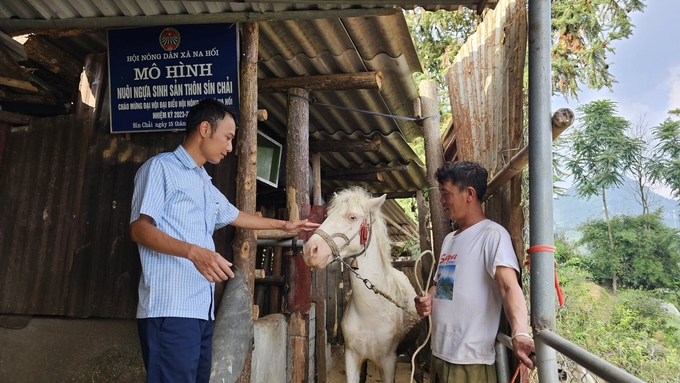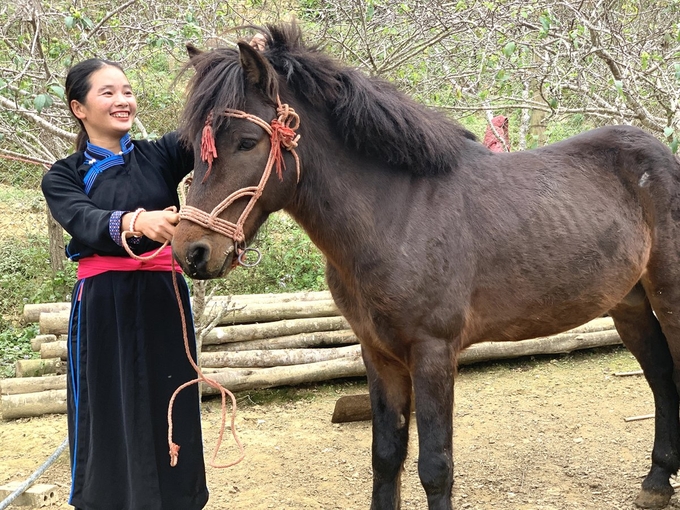May 19, 2025 | 17:55 GMT +7
May 19, 2025 | 17:55 GMT +7
Hotline: 0913.378.918
May 19, 2025 | 17:55 GMT +7
Hotline: 0913.378.918

Nong Van Toan (right) with the family's white horse. Photo: H.D.
The horse racing festival in Bac Ha has a history of hundreds of years, originating from the horse parade ceremony during the Lunar New Year of the Tay and Mong people. Every Tet holiday, young Mong and Tay boys would come to Bac Ha market and invite each other to compete to see who can reach their destination the fastest and get to the market the earliest. Whoever came first would get a drink.
The competition was simple and spontaneous, but it brought the boys excitement before the admiring looks of the girls on the way to the market and then since when has it become a traditional horse racing festival.
“According to the beliefs of the ethnic groups here, the horse is an animal blessed with good health. It is friendly, close to the human of the highland, and stand alongside farmers as a great companion,” said artisan Lam Quang Cua, a Tay man of Trung Do village, Bao Nhai commune (Bac Ha district, Lao Cai).
Those who were prepared made sure the horses were in their best condition. The chosen horse must be tall and have a broad chest, four sturdy legs, and upright hooves. It must eat enough grass and corn and be washed clean.
When spring comes, normally around the third day or fifth day of Tet, people choose a “healthy day, good day” such as the day of buffalo, the day of horse or the day of dragon to organize the festival. On the appointed day, people eagerly flock to both sides of the street to cheer and predict the winner.
Every horse is splendidly decorated. The horse must wear a red cloth tied into a large flower on its head and must wear a “po sen” string around its neck. The po sen is a bronze sausage string with bells that makes a bright sound wherever it goes.
In 2007 Lao Cai province began to restore the traditional horse racing festival, associated with local tourism development activities, attracting horse jockeys in the area to participate. The Bac Ha Horse Racing Festival is now officially held in June every year.
Every Sunday market session in Bac Ha town has a corner dedicated to horse trading activities. Horses are brought from all communes in the region for buyers to choose according to their needs and purposes. Having their mind on training race horses, buyers usually choose horses that are about 3 years old or older.
Chao Van Den from Na Quang (Bac Ha town) said, “When choosing a horse, you choose a horse with a small belly. Only with a small belly can the horse run fast. You can feed your horse pumpkin so that over time the horse's belly will shrink. When it is close to competition, the horses should be fed a little grass and more rice and corn so that they can be strong and gallop quickly”.
Trainers of the old days combined training with working on the fields, allowing the horses to run on diverse terrain. The horse would get used to adapting to the left and right reins as per the owner's wishes. Near the competition day, the riders then brought their horses to get acquainted with the racetrack. The owner and horse must work well together to win the first prize.

The women of Bac Ha are not inferior to men. In addition to farming and raising horses, they are also skilled riders on the racetrack. Photo: H.D.
A special feature of the Bac Ha horse racing festival is that the participating jockeys are purely farmers. These “cavaliers” are dedicated. They put in the work and take care of their horses. They love their companions. The riders of Bac Ha do not look extravagant, they do not even use saddles. There is nothing flashy in how they maneuver the race. It is just pure competition.
Nong Van Toan from Na Hoi commune (Bac Ha district) said: "My father has raised horses and participated in horse racing since his childhood. I am currently raising two white horses. I bought them for VND 35 million, and I would get approximately VND 55 million if I sell them now, but I choose to keep raising them. Compared to other livestock, the horse is much more efficient. When a race comes near, only in the afternoon do I bring my horse out to practice, but in the morning I still use the horse to carry loads in some fields where motorbikes cannot get on”.
The game has changed. Now not only men participate in this adventurous sport, but women are willing to show up and become strong contenders. Hoang Thi Tuyet from Na Kim village, Ta Chai commune (Bac Ha district) was the first female rider to participate in the traditional Bac Ha horse racing tournament in 2020. The audience on the field at that time was also surprised and impressed by the performance of this female “cavalier”.
Now, traditional horse racing in Bac Ha is not simply a tournament but also a vibrant festival for farmers, a very special event embedded with cultural nuances of the highland ethnic minorities’ "white plateau".
Translated by Samuel Pham

(VAN) 14 out of 35 domesticated elephants in Dak Lak province have had their living conditions improved, with 11 of them currently participating in the non-riding elephant tourism model.

(VAN) Muong Nhe Nature Reserve hopes that being upgraded to a national park will lay the foundation for forest protection efforts to be carried out in a systematic, modern, and sustainable manner.
/2025/05/16/3923-2-171845_52.jpg)
(VAN) Lower costs, higher yields, and improved soil quality are outstanding benefits that soybeans bring when integrated into the crop rotation system.

(VAN) The 'For a Green National Environment' programme aims to promote a green lifestyle, support businesses in implementing ESG practices, and turn Net Zero commitments into concrete actions.

(VAN) Cold-barn systems efficiently manage environmental and temperature conditions, which aids in the prevention of respiratory diseases in pigs and protects them from the vectors that transmit African swine fevers.

(VAN) To tackle challenges, the project 'Addressing key technical bottlenecks in the grouper supply chain in Vietnam' has been underway since 2024.

(VAN) The project 'Disease-Resilient and Sustainable Cassava Production Systems in the Mekong Region', funded by the Australian Center for International Agricultural Research (ACIAR), is being implemented from 2024 to 2028.